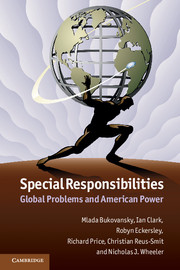Introduction
Published online by Cambridge University Press: 05 June 2012
Summary
During his visit to China in November 2009, US President Barack Obama gave a joint press conference along with China’s President Hu Jintao. In his statement, Obama identified three major global problems: nuclear proliferation, climate change and economic recovery from the global financial crisis. Their common feature, he insisted, was that none could be solved by either state acting alone. He therefore welcomed China’s greater role, ‘a role in which a growing economy is joined by growing responsibilities’. This emphasised the seeming proportionality between the material resources enjoyed by a state, and the scale of responsibilities it was required to shoulder. It explicitly brought together one view of international politics, as rooted in material resources, with an importantly different view, as rooted in social responsibilities.
There are four interesting dimensions to this statement. First it specified those key global problems in particular. Second it attempted to address them by an explicit appeal to responsibility. Third it assumed that increased responsibilities flow from greater material resources. Fourth it attempted to (re)allocate these responsibilities to reflect those new material distributions.
- Type
- Chapter
- Information
- Special ResponsibilitiesGlobal Problems and American Power, pp. 1 - 22Publisher: Cambridge University PressPrint publication year: 2012



